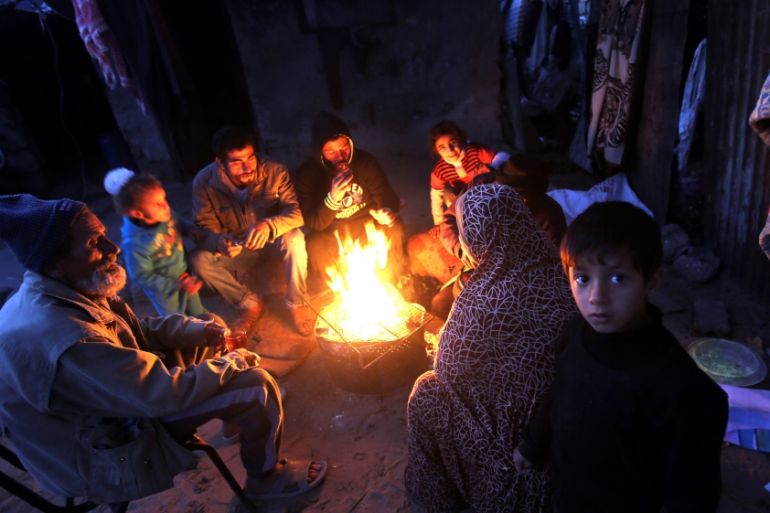Who speaks for Palestine?
Last-gasp effort for the two-state solution leaves Palestinians out in the cold.

Paris, France – Like something out of a dark comedy in which you are forced to live each day over and over again, yet another Middle East peace initiative has reconvened, promoting renewed confidence in the ever-elusive two-state solution.
If John Kerry’s recent speech was considered a eulogy of the two-state settlement, this latest Paris summit is surely the effort to once again bring it back from the dead.
Keep reading
list of 4 itemsRussia-Ukraine war: List of key events, day 810
Russia-Ukraine war: List of key events, day 809
Russia’s Putin to remove Sergei Shoigu as defence minister
Indeed, the two-state solution has been announced dead time and again – as far back as when Bill Clinton, as US president, tried to spearhead negotiations between Yasser Arafat and Ehud Barak.
Yet, as recently as US Secretary of State Kerry’s speech, Western countries – particularly the US – keep trying to revive it.
READ MORE: Francois Hollande – Two-state solution is the only way
Missing from these initiatives is a concrete idea of who the Palestinians are even represented by.
Western countries have obviously favoured the Fatah-dominated Palestinian Authority (PA), led by Mahmoud Abbas – a president whose term ended eight years ago – and unelected bureaucrats.
But the PA cannot even claim to be representing those Palestinians only living in the occupied territories, since it does not even maintain control of the Gaza Strip, where nearly two million of them live.
The PA also faces widespread criticism in the Israeli-occupied West Bank where its security forces cooperate with the Israeli military.
Other Palestinian groups, including Hamas, remain noticeably absent from these meetings.
Palestinians living in the diaspora, including the millions who have only known life in refugee camps in Lebanon, Syria, Jordan and elsewhere, are conspicuously absent from the discussion, despite the Palestinian call for the refugees’ “Right to Return” home to Israel-Palestine being a fundamental question to resolving the Israeli-Palestinian impasse.
Palestinians living inside Israel under what many human rights observers consider to be clear discriminatory laws, meanwhile, are left out of the conversation entirely, which requires a questioning of why the conflict is being framed without their voices.
These facts are not particularly eye-opening to Palestinians and those observers who have been following this issue closely for the past few years.
But this reality appears to fade when one enters the diplomatic arena.
Though Israel denounced this latest French initiative, to be sure it has only benefited politically and economically from the 20-year-long peace process known as the Oslo Accords – a fact that has been well covered.
Israel’s resistance to the French conference can surely be explained by the fact that its current government has all but outright rejected the notion of a Palestinian state and – in keeping in line with previous governments – resisted any efforts to involve the wider international community.
It is for these same reasons that Israel has been so combative with regards to recent UN efforts – though merely symbolic – to recognise a Palestinian state and call for Israel to abide by international law and halt its settlement construction.
READ MORE: Summit tackles elusive Israel-Palestine peace
But for all these UN resolutions, International Court of Justice opinions, and peace conferences, not a single political actor in the diplomatic arena has chosen to address the most crucial question: Who will actively force Israel, the occupier, to abide by international law?
Western governments can’t claim ignorance to this question and to Palestinian demands.
They have been actively fighting the largest nonviolent, grassroots effort to force Israel to abide by international law – namely, the boycott, divestment, and sanctions movement that has been endorsed by more than 200 Palestinian civil society organisations.
While France, the country that is ironically hosting the peace conference, has all but banned BDS advocacy, Kerry in his remarks even bragged about fighting it: “We have strongly opposed boycotts, divestment campaigns, and sanctions targeting Israel in international fora.”
Whether or not one supports BDS efforts, Western governments’ allergy to the movement, along with their unwillingness to offer alternatives for frustrated Palestinians to force Israel’s hand, has raised questions among many.
In fact, that BDS activists enjoy such support, particularly among Palestinians on the ground, probably means they, too, should be part of the conversation – but, like most Palestinians, they have been left out.
Ultimately, while recent efforts to call on Israel to abide by international law and halt its settlement activity may have renewed some observers’ optimism, it remains to be seen what will tip the balance of power in the current conflict and force an actual settlement.
One thing that 20 years of peace conferences and summits have taught us, however, is that these charades certainly won’t change much.